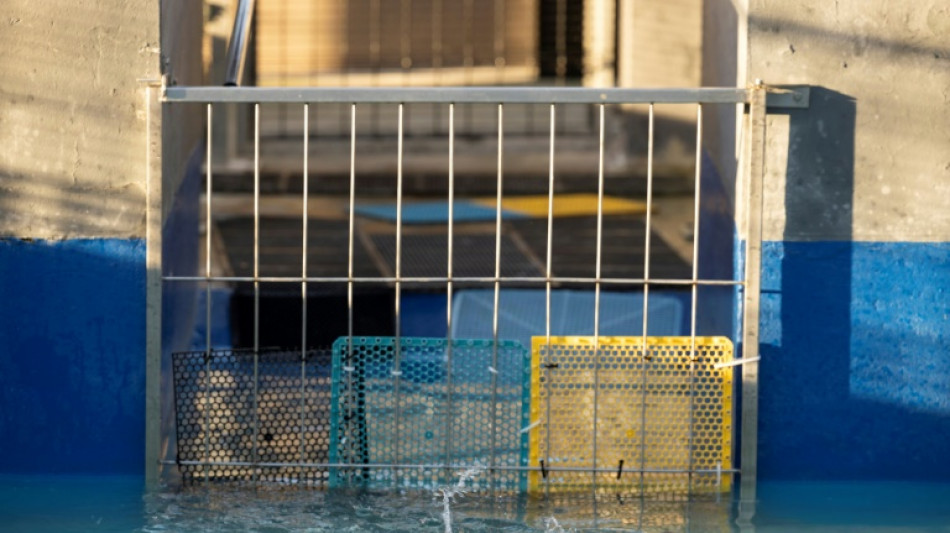
-
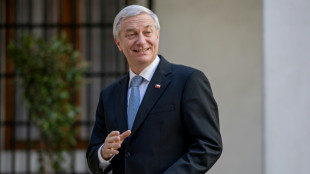 Chile president picks Pinochet lawyers as ministers of human rights, defense
Chile president picks Pinochet lawyers as ministers of human rights, defense
-
Osaka says 'I'm a little strange' after Melbourne fashion statement
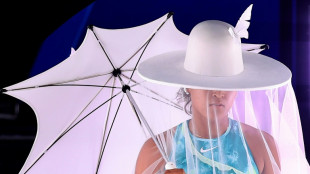
-
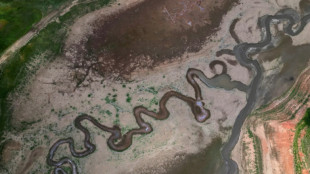 UN report declares global state of 'water bankruptcy'
UN report declares global state of 'water bankruptcy'
-
Trump heads for Davos maelstrom over Greenland

-
 Ukraine's Oliynykova wants Russian, Belarusian players banned from tennis
Ukraine's Oliynykova wants Russian, Belarusian players banned from tennis
-
Kasatkina cannot wait to be back after outpouring of Melbourne support

-
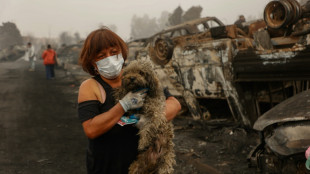 Chile blaze victims plead for help from razed neighborhoods
Chile blaze victims plead for help from razed neighborhoods
-
Russian minister visits Cuba as Trump ramps up pressure on Havana

-
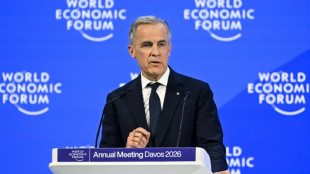 World order in 'midst of a rupture': Canada PM Carney tells Davos
World order in 'midst of a rupture': Canada PM Carney tells Davos
-
Senegal's 'historic' AFCON champs honoured with parade, presidential praise

-
 Audi unveil new car for 2026 Formula One season
Audi unveil new car for 2026 Formula One season
-
Man City humiliated, holders PSG stumble, Arsenal remain perfect

-
 Vinicius, Real Madrid need 'love' not whistles: Bellingham
Vinicius, Real Madrid need 'love' not whistles: Bellingham
-
Late Suarez winner stops Champions League holders PSG in Lisbon

-
 Frank seeks Spurs 'momentum' after beating Dortmund
Frank seeks Spurs 'momentum' after beating Dortmund
-
Jesus' 'dream' brace at Inter fires Arsenal into Champions League last 16

-
 US regulator appeals Meta's court victory in monopoly case
US regulator appeals Meta's court victory in monopoly case
-
Netflix shares fall as revenue appears to stall

-
 Tottenham beat 10-man Dortmund to hand Frank stay of execution
Tottenham beat 10-man Dortmund to hand Frank stay of execution
-
Mbappe, Vinicius help Real Madrid thrash Monaco in Champions League

-
 Men's Fashion Week kicks off in Paris with Louis Vuitton show
Men's Fashion Week kicks off in Paris with Louis Vuitton show
-
Jesus fires Arsenal past Inter and into Champions League last 16

-
 Muted anniversary: Trump marks first year back with grievances
Muted anniversary: Trump marks first year back with grievances
-
Humiliated Man City have to 'change the dynamic': Guardiola

-
 Golden State's Butler out for season with ACL injury: agent
Golden State's Butler out for season with ACL injury: agent
-
Venezuela woos US oil majors with new investment czar

-
 Wales Six Nations strike threat just 'speculation' for Tandy
Wales Six Nations strike threat just 'speculation' for Tandy
-
Syria government agrees new truce with Kurdish forces

-
 Russian interior minister in Cuba, which faces pressure from Trump
Russian interior minister in Cuba, which faces pressure from Trump
-
US finalizes rule for deep-sea mining beyond its waters
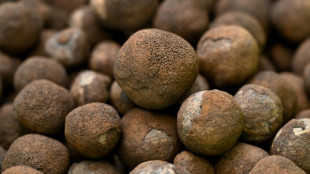
-
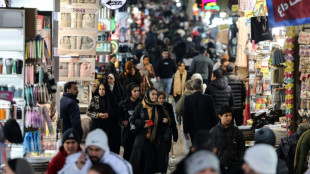 Iran protest crackdown latest developments
Iran protest crackdown latest developments
-
Muted anniversary: Trump marks first year back with familiar grievances

-
 Man City stunned by Bodo/Glimt in epic Champions League upset
Man City stunned by Bodo/Glimt in epic Champions League upset
-
Cooler temperatures offer respite for Chile firefighters
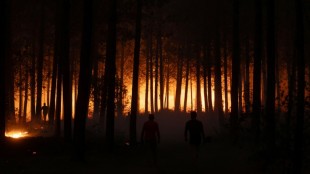
-
 Scientists plan deep-sea expedition to probe 'dark oxygen'
Scientists plan deep-sea expedition to probe 'dark oxygen'
-
Howe calls on Newcastle to use spirit of Robson to inspire win over PSV

-
 Massive US presence makes its mark on Davos
Massive US presence makes its mark on Davos
-
Ter Stegen to join Girona on loan: Barca coach Flick

-
 France PM forces part of budget through parliament without vote
France PM forces part of budget through parliament without vote
-
Scotland boss Townsend picks veterans Gray and Cherry for Six Nations
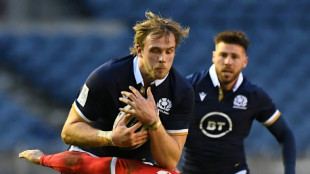
-
 Record try-scorer Penaud faces French axe for Six Nations
Record try-scorer Penaud faces French axe for Six Nations
-
UK approves plans for Chinese mega-embassy in London
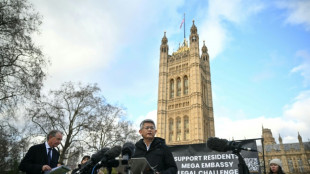
-
 Rosenior keen to build winning ties with 'world-class' Fernandez
Rosenior keen to build winning ties with 'world-class' Fernandez
-
Dakar delights in Senegal parade honouring AFCON champions

-
 UK comedian Russell Brand in court on two new rape charges
UK comedian Russell Brand in court on two new rape charges
-
France set to face New Zealand with second-string squad
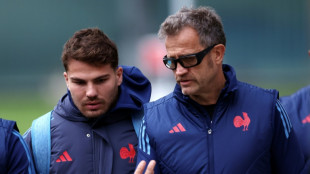
-
 Eyeing China, EU moves to ban 'high-risk' foreign suppliers from telecoms networks
Eyeing China, EU moves to ban 'high-risk' foreign suppliers from telecoms networks
-
Struggling Suryakumar will not adapt style to find form before T20 World Cup
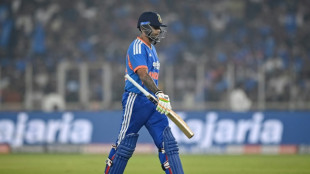
-
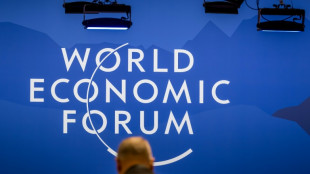 World stocks sink, gold hits high on escalating trade war fears
World stocks sink, gold hits high on escalating trade war fears
-
Easier said than done for US to apply tariffs on single EU states


S.Africa clinic hopes to save penguins' future
A small fish is dangled under the beak of an emaciated penguin at a South African clinic, to whet the bird's appetite.
The sickly animal is among dozens undergoing treatment in the coastal town of Gqeberha, where a dedicated rehabilitation centre is on a mission to bring African penguins back from the brink of extinction.
"We are trying to reverse some of the human damage caused to these birds over the years," says Caitlin van der Merwe, a seabird ranger at the Southern African Foundation for the Conservation of Coastal Birds (SANCCOB).
Threatened by climate change and human activity, the endangered species, which waddles awkwardly on land but turns into a fast-swimming torpedo in the water, has suffered a drastic decline in numbers.
Around 50,000 mating pairs -- penguins are monogamous -- inhabited the shorelines of South Africa and Namibia three decades ago. Today the number has dropped to 10,000 pairs.
That's a jaw-dropping 80 percent population decrease, which zoologists say is even more worrying given that a healthy penguin population is considered indicative of a healthy marine ecosystem.
"The species declining, that means there's a big issue in the marine environment," says Carl Havemann, who heads the penguin clinic.
- Climate threat -
The centre is currently teeming with feathered patients.
Over the past two weeks, about 40 baby penguins have been transferred here from Bird Island, an islet home to one of Africa's largest penguin colonies about 60 kilometres off Gqeberha, formerly known as Port Elizabeth.
Heavy rains have battered the island, washing away nests and chicks.
The little black and white birds traditionally dug their nests into a thick layer of guano - a mixture of droppings and remains that accumulate over time.
But the organic substance has been plundered for use as natural fertiliser, and the penguins now have to make do with branches or in cracks in the rocks, which make for a less sturdy home.
And for the first three months of their lives the birds are covered only by grey plumage that offers little protection from water and cold.
The rains caused many to drown or die of hypothermia.
"With climate change, weather events are becoming more and more extreme and these obviously impact the natural colonies," Havemann says.
- Footbath -
Some survivors are being treated in the seabird rehabilitation centre's intensive care unit, where staff are busy disinfecting, stitching and bandaging wounds.
Footbaths, sardines and medicines are also part of the treatment.
In total, around 100 birds, both young and adult, are cared for in the clinic.
The goal is to return them to the wild in the shortest time possible, limiting interaction with humans to what is strictly necessary.
The penguins huddle together, their shoulders raised as if they are perennially cold.
Some are kept hydrated through a small tube inserted in their gullets. Desperate ones are euthanised.
For those who are fit enough, rehab continues in the pool.
"If they don't swim, they don't drink," says van der Merwe, as she whispers soothing words to a small penguin furiously waving its wings while she holds it between her thighs.
It is suffering from borreliosis, an infectious disease caused by bacteria, and needs antibiotics.
Besides extreme weather events, African penguins are also threatened by diseases, overfishing and pollution.
Gqeberha is home to a major port and huge cargo ships refuel offshore.
Spills in the recent past have seen frantic attempts to rescue and clean up oil-tarred penguins.
At current rates of decline, African penguins could become extinct within a decade, according to the Environment Ministry.
"The ocean has such a complexity. If we take bits here and there, the whole system will collapse," van der Merwe says.
L.Dubois--BTB




